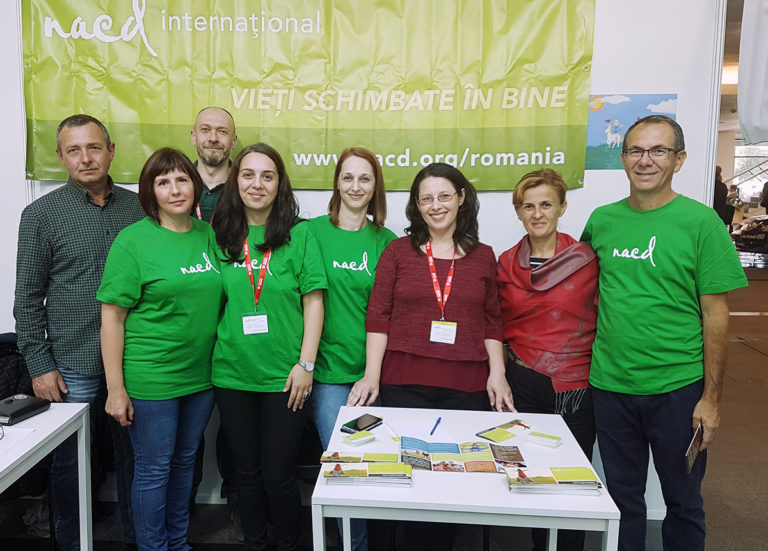Down Syndrome: “Daniel”
My firstborn, Daniel, was born with a chromosomal abnormality known as Down Syndrome. The medical term for Daniel’s condition is Trisomy 21. This means that he has three #21 chromosomes instead of two. This extra chromosome blocked proper nutrition to all the cells in his body before and after birth, resulting in a very weak and poorly developed baby.
Daniel was diagnosed with Down Syndrome shortly after his birth. His stay in the hospital was filled with negative outlooks, from professionals, regarding his future development. It was beyond us that anyone could know, without a doubt, what a tiny baby’s future could hold. That’s when my husband, Ken, and I decided to search for more answers. But where we could we go to gain the expertise we needed to help Daniel? This was a burning question in our minds and hearts, and one to which we would not get an answer for a few months.
We welcomed Daniel home with much excitement and joy. Yet, underlying this festive atmosphere, were so many questions and fears of the unknown. Those fears were there simply because no professional seemed to know what to do to help improve Daniel’s condition, just simply treating the symptoms caused by his condition. In our search for knowledge, we discovered that there was little help available for our son. And, what I mean by little, is one hour a week of physical therapy. Even we, as new parents, knew that this would not be enough to help improve Daniel’s poor muscle tone and his weakened respiratory system. He was barely thriving, even though I had successfully been able to breast feed him.
Before we learned of Robert J. Doman, Jr., Founder of The National Association for Child Development (NACD), we had been working on a home program with Daniel. In June of 1981, we attended a seminar, entitled “Miracles of Child Development” given by Robert J. Doman, Jr. The seminar gave us a wealth of information on child development. This seminar added to our understanding of what we had already learned in working with Daniel on his current home program. My husband had only agreed to attend this seminar out of curiosity. He truly felt that we would continue to utilize Daniel’s current home program. But, when it came to his son, he was open to any possibilities of helping him, as was I. That conviction is what helped us to decide to have Daniel evaluated by Mr. Doman. Mr. Doman’s evaluation of Daniel (who was almost 9 months old) was extremely thorough. Daniel WAS crawling on his tummy, but in a very poor fashion. He initiated no cross pattern movement, even though we were cross patterning him at home. He was very alert, but his health was poor. His appearance alone, projected his poor health.
As soon as Daniel’s evaluation was completed, Mr. Doman wrote Daniel’s new home program. He explained, in great detail, each activity on Daniel’s program. As we listened, both of us became more confident and excited about our roles, as parents, in working with our tiny son. What became apparent to us is that, armed with the know how, we would be Daniel’s best therapists and teachers. We could give him that one-on-one he so desperately needed.
The MAJOR difference between this NACD program and Daniel’s previous program was how SPECIFIC it was for Daniel’s needs. He wasn’t just part of a group of children with Down Syndrome, doing all the same therapies. This program treated him as an individual, and, therefore, would be more beneficial. To cite an example of the specificity of Daniel’s NACD program, one of the activities was to cover his mouth 30 times a day and mask him 30 times a day (this was a deep breathing exercise). Daniel was a mouth breather and had a tongue thrust. His vital capacity was low, and that did not help his energy level. With more energy, we knew he would be able to accomplish more. I remember both of us being delighted that we could do something to help these problems. Another activity on his NACD program was a tactile sequence. Daniel’s tactility was very low. We learned that, unless he could feel properly, mobility, manual competence and muscle development would not improve greatly. It all made so much sense to us. Nowhere else had we ever gotten the impression that we, as parents, could comprehend what was necessary to help our child. Our experience was to the contrary. What a refreshing change!
As we shook Mr. Doman’s hand and thanked him for his time, how much more hopeful we felt about Daniel’s future. What a relief to know that we could help him in very specific ways. This was REAL HOPE! As we walked to our car, I remember my husband, Ken, saying, “That’s it! This NACD program is for Daniel and us.” No longer was there skepticism in his words. We drove home, anxious to begin this new program. We knew now that Daniel’s potential was as unlimited as that of any child’s. We also knew that this new journey, we were about to embark on, would take lots of work, but it would make a real difference in Daniel’s life. We were MOTIVATED!
That was a very long time ago. Daniel is now 14 and a half years old. He has accomplished so much since his first NACD evaluation. I will attempt to cover as many of these accomplishments as possible. The best way I know to do this is to go through each area of development.
MOBILITY: Daniel’s muscle tone improved so much that he was able to accomplish an excellent cross pattern crawl (on tummy), cross pattern creep (on hands and knees) and his walk and gait are good. He can hop on one foot, skip and jump. Muscle balance has continued to improve and the awkwardness he used to have is gone. He can even run up a flight of stairs without holding onto the railing. Quite an accomplishment! He learned how to ride a two wheeler, and even conquered riding up and down hills. He practices sprinting everyday. He gets faster all the time, and even competes in a track meet in the Spring with his peers. He plays soccer, swims well and has a great love of dancing. Because of all the work he has done on his home program, his accomplishments are many. He keeps up very well with his peers, and sometimes, outshines them.
LANGUAGE: Daniel ‘s comprehension and use of new vocabulary continues to improve. He has quite an appropriate sense of humor. His ability to converse keeps getting better. It took him awhile to start talking, and the first words he used in his language were the words he had learned to read on his NACD program. He went to a speech therapist once and accomplished next to nothing. The lip, tongue and mouth exercises that he worked on at home enhanced his speech far more. Daniel has been on the Speech Team at school for two years in a row. He did well last year, memorizing and distinctly saying his speech. There was a marked improvement this year in his delivery of his speech, and it yielded him a BLUE RIBBON.
MANUAL COMPETENCE: Daniel’s fine motor development and strength in his hands are very good. He writes well in cursive. He can zip, button, snap, buckle and tie his shoes. All of which give him even more independence. He swings on the overhead ladder (monkey bars, as some people refer to them) from rung to rung, with great ease. Utilizing the overhead ladder is an activity on his NACD program. He now weighs 110 pounds and is very accomplished in this activity. Presently, he is learning to type on the computer keyboard. Manipulation of his fingers is still improving.
VISUAL COMPETENCE: As a 9 month old, when he first started program, both of Daniel’s eyes were badly crossed. This has been corrected to a great extent by use of various exercises on his NACD program. His eye-hand coordination continue to improve, making playing Nintendo, catching and batting much more fun for him. He is an excellent reader and is still moving forward in his reading abilities. His visual short term memory is above average and his visual long term memory is excellent.
TACTILE COMPETENCE: All the problems he had in this area, as a baby, have since disappeared. He feels properly and all areas of his development have benefitted.
AUDITORY COMPETENCE: His ability to understand conversations is good. Daniel’s auditory short term memory is average and his auditory long term memory continues to improve.
BEHAVIOR: A normal environment is what Daniel has always been a part of at school and at home. His life has been filled with lots of positive. Always, he has been disciplined, when necessary. We never let him get by with inappropriate behaviors, because we knew that someday he would have to be out there in the world with his peers, and we wanted him to be accepted. He is still learning in this social area of development. Appropriate behavior was always emphasized on his NACD program and guidance given to us when necessary.
HEALTH: For 8 years, Daniel was on a metabolic treatment known as the U Series, dispensed by Dr. Henry Turkel. NACD informed us of this medical approach, and we decided to pursue it. Daniel was fortunate not to have heart problems, but his inefficient respiratory system caused enough problems for him. At age 2 and a half years, Daniel was hospitalized with severe croup, which resulted in a tracheostomy. His NACD program helped him bounce back much more quickly. His respiratory system is much more efficient now and he has minimal problems with colds these days. He is very healthy now.
ACADEMICALLY: He is in a normal sixth grade classroom, and working very hard at keeping up. School is more for social reasons. His NACD program is what keeps him climbing that academic ladder. His last evaluation was in December 1994 and his academic test scores were as follows: Math 6 grade 3 mo., Word Recognition 8 grade 4 mo., and Comprehension 10 grade 2 mo.
Daniel’s younger bother, Ryan, has also benefitted from Daniel’s program, and is reading and doing math significantly above grade level. He looks up to his hard working, big brother. Most of Daniel ‘s major developments have been accomplished. We are in the process of fine tuning. His NACD program has done so much for his development, his life, and continues to do so. The successes are somewhat smaller these days, but I know that the end result will be a young man who has achieved his potential. He will contribute to society. He will succeed.




